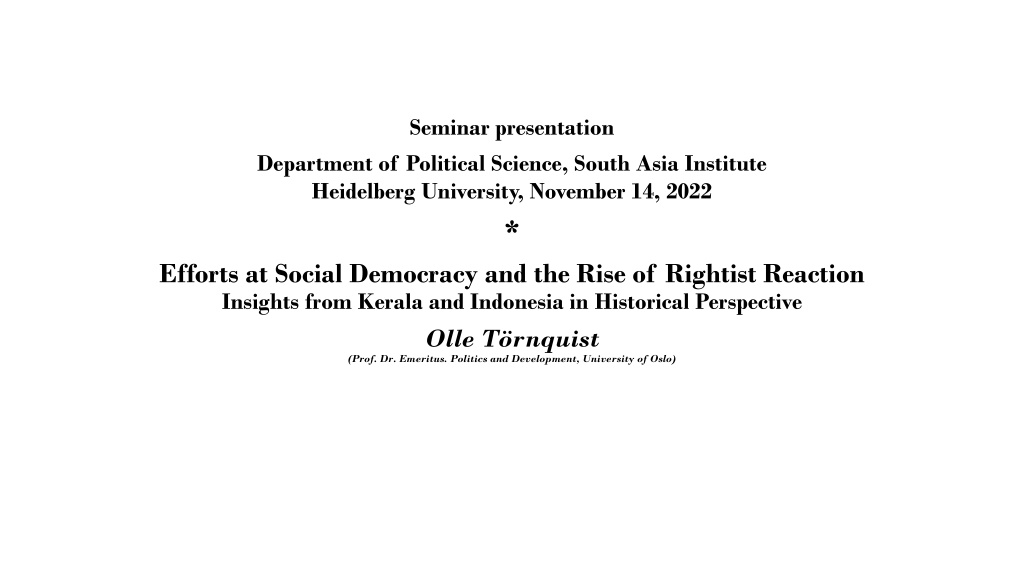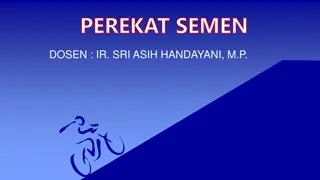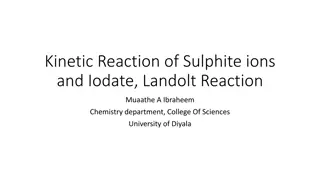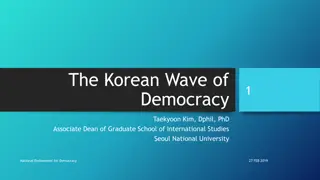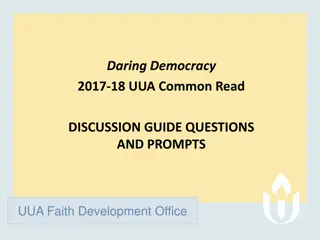Efforts at Social Democracy and Rise of Rightist Reaction: Insights from Kerala and Indonesia
Comparative historical analysis explores efforts at social democracy in Kerala and Indonesia, highlighting successes and failures post-independence. Examining socio-political dynamics, the presenter delves into the collapse of liberal democracy waves and the challenges faced by progressives globally.
Download Presentation

Please find below an Image/Link to download the presentation.
The content on the website is provided AS IS for your information and personal use only. It may not be sold, licensed, or shared on other websites without obtaining consent from the author. Download presentation by click this link. If you encounter any issues during the download, it is possible that the publisher has removed the file from their server.
E N D
Presentation Transcript
Seminar presentation Department of Political Science, South Asia Institute Heidelberg University, November 14, 2022 * Efforts at Social Democracy and the Rise of Rightist Reaction Insights from Kerala and Indonesia in Historical Perspective Olle T rnquist (Prof. Dr. Emeritus. Politics and Development, University of Oslo)
1. Introduction These days we need to claim the relevance of our studies right here in Europe. To make the current dynamics less insular, one needs to know what shaped them. It s not only a North Atlantic and European story but global. And we know something of this. Grand mystery that although the West won the cold war and there was a third wave of liberal democracy, progressives have lost ground to nativist reactions. My point of departure: we can t solve the mystery and discuss ways ahead without asking why the second anti-colonial and then third liberal wave of democracy collapsed.
This calls for comparative historical studies of efforts at broadly defined social democracy, beyond party-labels, in different contexts. So, engaged in retrospective re-reading with this in mind of what I had arrived at since the 1970s in Indonesia, the Philippines and India, especially Kerala, Scandinavia, and with references to South Africa and Brazil. the book. But first necessary to conceptualise broadly defined social democracy . This done with historical analysis of efforts at development based on social justice by democratic means. That generated ideal types of universal social democratic pillars and strategies during different generations/conditions.
So this done in a number of contexts. But since you are south asianists we focus on Kerala. Yet, like Gunnar Myrdal ignored the American post WW II distinction of SE Asia, we stretch out S Asia to the entire southern Asia. This allows us to focus today on the two paradigmatic examples of initially very successful efforts at broadly defined social democracy, one of which failed and suffered a massacre and dictatorship, Indonesia, while the other stood tall in-spite of troubles, Kerala.
2. Success & failure in Indonesia & Kerala after independence After Stalin s extremism, 1951 two soc-dem oriented roadmaps: (i) West-oriented socialists for modernisation w. liberal democracy (ii) Reform-oriented communists and left-nationalists adjusting to electoral democracy and focusing on broad fronts based on anti-imperial nationalism along with equal citizenship as an umbrella for unifying various classes and groups with different demands for land-reform, better work conditions & wages, welfare etc. The second brand was remarkably successful in both contexts. Kerala had deep roots in socio-religious reform movements for equal citizen rights and low cast groups joining the socio- economic struggles for land reform & labour rights. Won state- elections 1956. In Indonesia reformist communists/left nationalists expanded rapidly. Huge gains in national elections 1955 and won local 1957. Expected to win next general election.
Mid-late 50s, Kerala&Indonesia subject to US backed interventions. Kerala government expelled. Indonesia regional rebellions. Kerala progressives held on to democratic priorities & reforms. Main problem the unforeseen role of politics in the rise of corruption, and post land-reform commerce and speculation. Thanks to political competition, no collapse as later on in West Bengal. In Indonesia, however, as elsewhere in the South, both soc-dem camps sensitive to cold war priorities. From c.1957 democracy de-prioritised. The western oriented opted for the US/Samuel Huntington s politics of order (strong political institutions w. military) before democracy. The reformist-communists/left-nationalists, opted for an anti- imperialist alliance with left-populist President Sukarno along with the loyal majority of the military. Guided Democracy , with less freedoms and no elections.
Also, military and others in command could use control of public resources for primitive accumulation of capital. This political path to capitalism was unexpected by dominant Marxism. Could not do much to contain it without freedoms and democracy and the previous focus on equal civil and political rights. Result by 1965 : elimination of entire movement, genocide, 30 years of authoritarian capitalism, confusion among survivors. Belated rise of fragmented & mainly liberal democracy movement. In general conclusion, the Maoist and extreme left argument wrong. Failure not because of reformism and non-violence but because of giving up on equal citizenship and democracy which Kerala proved viable; plus because not able to analyse political primitive accumulation.
3. Global implications, including in the North The demise of the second wave of democracy counter movement of US- but also Soviet backed authoritarian development and stronger Chinese statism. Washington scrapped (1971) the Bretton Woods regulations that provided space social-liberal/soc-dem policies. Paved the way for global neo-lib undermining national Keynesianism. Brandt and Palme tried to globalise Keynesianism with partners in the South (NIEO), but they now too weak. E.g. Allende overthrown In Europe, (1980s ) social democrats gave up socialist reforms and opted for structural adjustment. Attempts at third way did not get everyone aboard , thus enabling nationalist right-wing leaders to benefit from increasing popular discontent.
4. The rise and demise of the third wave of democracy Meanwhile, however, the rise of the third wave of democracy in S. Europe, Global South and Eastern Europe. Also to Asia with the 1986 people power revolution . But we focus on Indonesia s democratisation from 1998 & on Kerala, benefitting from civil society initiatives People s Planning Campaign 1996. However, just after transitions to democracy as in Indonesia, dominant groups gained control of the new rules of the game. Basic question: why did not various social democrats do better, and why is Kerala again a partial exception. Five main conclusions (i) dearth of common class interests; (ii) limited democratic representation; (iii) bottom up not enough; (iv) broad alliances for comprehensive reforms possible; (v) need for strategy and partnership representation.
4.1. Dearth of common class interests No social democratic economic policies and support as after WW II. Uneven economic and social development. Lack of class-based community and organisation and constant difficulties to unify people with precarious work conditions. This affected Kerala too. (We set aside China as a special authoritarian story.) Hence, interest-based collectivities cannot be built only at the level of production. Social democratic growth strategies from Scandinavia presupposing low unemployment are insufficient.
4.2. Limited democratic representation Couldn t the democracy-wave compensate for this? No, the wave never supposed to do that. In countries like Indonesia where dictatorships were replaced with democracy this turned shallow & dominated by elites & oligarchs short of interest in including others & fighting corruption. This was rarely resisted by the international democracy support that encouraged pacts among the elites about new rules of the game. Pacts which meant that pro-democratic movements rarely got a chance to make a difference. Kerala was a partial exception we shall return to that. But typically, even the celebrated examples of liberal democratisation backslided. Like Indonesia. Or South Africa, or India, the Philippines, Brazil... And Military interventions as in Afghanistan made things worse. While popular protests, as the Arab Spring, were short of both organisation and international protection.
4.3. Bottom up is not enough Possible to promote more meaningful development and democracy from below ? No! CSOs, unions, and social movements important but difficult to combine from below. Kerala did better, but bottom up is not enough. The democracy movements lost out in transitions to elite democracy. In Indonesia, most activist driven movements turned scattered pressure and lobby groups. In the Philippines not even able to take advantage of local budgeting. In South Africa marginalised by ANC-dominated polity. In Brazil participatory budgeting didn t help against national level corruption, so Bolsonaro. Indian rights & reforms facilitated by Sonia Gandhi promising but short of coordination and mass movements, so the BJP . The most impressive popular participation within Kerala s decentralised governance. First campaigns like literacy and resource mapping from below, then the state-wide people s planning. But little institutionalisation and sustainable production. Reluctant CSOs and interest-based organisations rarely took part. And political resistance, also leftist. Until recently difficult to scale up and relate local initiatives to other levels and actors.
4.4. Broad alliances for comprehensive reforms possible Yet possible to build broad alliances of progressive politicians, unions, popular groups, & CSO activists, including media, for equal civil rights, along with potentially transformative welfare and development reforms. E.g. local alliances in Indonesia for urban development considering the poor, and, as briefly with AAP for welfare & non-corrupt service provision. Or the successful alliance 2010-12 for Indonesia s universal public health reform. Third example the Kerala Left Front election victories due to universal health and welfare measures during Covid-19. Possible thanks to the decentralised public action decades ago. But now supplemented with state level finance and programmes. Plus promises to promote knowledge-based development. Kerala thus resisted India s chauvinist and religious identity politics. At best, broad alliances for rights and welfare may generate strong enough collectivities to negotiate social growth pacts, such as for knowledge-based development in Kerala. BUT two obstacles
4.5. Need for strategy and partnership representation Shortage of series of reforms. Activists having won the battle for one reform often return to diverse activities as in Indonesia, instead of developing & uniting behind new reforms, gradually strengthening people s capacity. 2. Poor representation. Direct negotiations between populist leaders and unions and CSOs civil society groups not institutionalised & made democratic but turn into transactional horse trading divisions shrewd powerful leaders. As in Indonesia when movements lost out in their cooperation with President Jokowi, which paved the way for right wing populism/religious groups Important in Kerala too to institutionalise a democratic framework for partnership governance in designing & implementing the new promising efforts to combine local and state level programmes and to foster knowledge-based development. If not, risk that powerful party leaders and ministers will dominate. (See follow up in EPW, 18/6, 2022)
5. Implications in the North In Europe the failure in Russia of the 3rdwave of neo-liberal and elitist democratisation generated the usual authoritarian and chauvinist reactions and now even a devastating war is of course the most clearcut example. The partners from the Global South are weakened in negotiations to contain the climate crisis and to regulate globalisation and reclaim space for democratic decisions on progressive reform agendas against conservative nativism. Weaker pro-democratic forces in the South means more conflicts and refugees. Least Swedes forget, for example, how our social democratic leaders tried in 2014-15 to overcome the limitations of the third way with social democratic internationalism, but stumbled on the lack of support on part of the West for the Arab Spring which led to the refugee crisis, the sealing of Swedish borders too, and to the idea of nativist democracy and welfare gaining wider acceptance.
6. In conclusion From c.1957, the deprioritisation of efforts at equal citizenship and democracy that Kerala proved could be avoided: the petering out of the second democracy wave. authoritarian counter movement that weakened efforts to contain rising neo-liberal globalisation with NIEO undermined social democracy in the North too, and paved the way for discontent and conservative nationalism. The third liberal wave of democracy an open window, but, as illustrated by Indonesia & partly Kerala, uneven neo-liberal development: dearth of common class interests to build an alternative. democratisation remained elitist with, aside from Kerala, ltd representation of pro-democratic forces Kerala proved impossible to congregate CSOs and social movement from below increasing discontent and wider space for conservative counter movements and autocratisation best resisted by Kerala.
The crux is that the liberal third wave of democracy has nourished an authoritarian reaction due to its connection to global neoliberalism, continued elitism and corruption. Therefore, liberal democracy can only be defended as part of a social-democratically oriented counter-movement Possible if liberal leftists & greens in the North not adjust to insular nativism to gain votes but build alternative international cooperation with actors and movements in the South that have, as proved it possible even in countries like Indonesia but certainly more advanced in cases like Kerala, and now perhaps also in Chile, Colombia and Brazil to build broad alliances for series of comprehensive political and social reforms that must also include democratic partnership governance.
